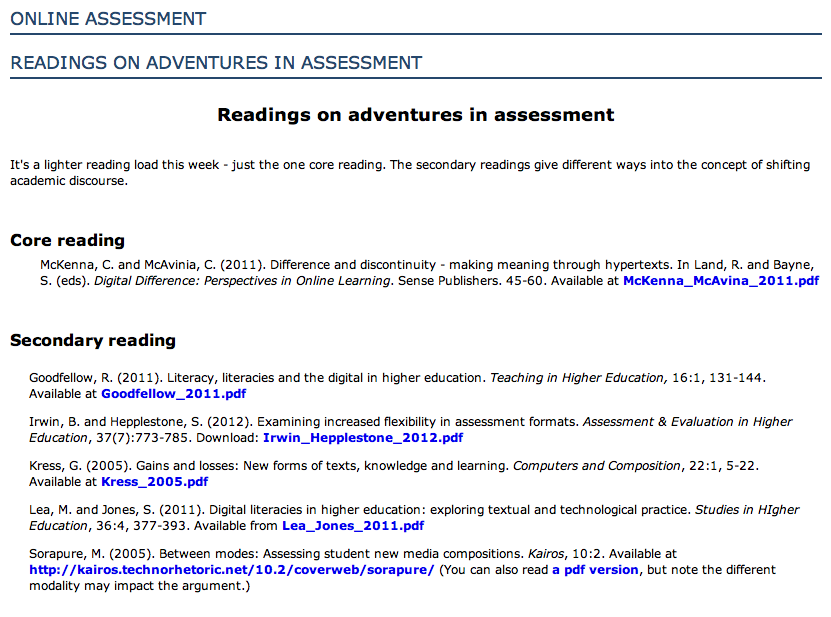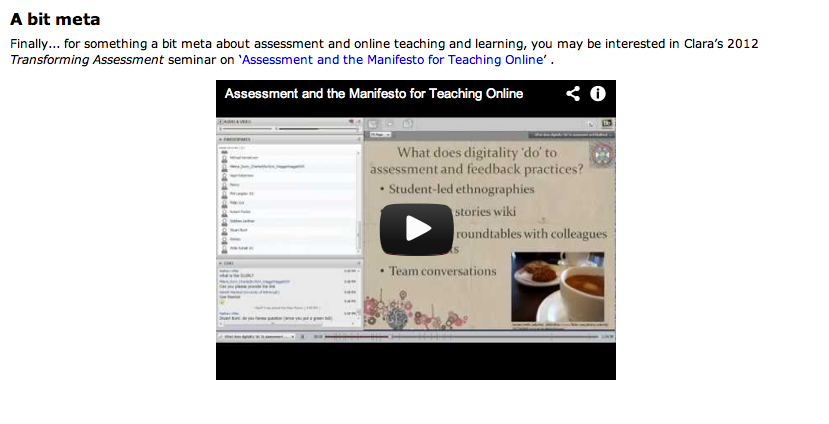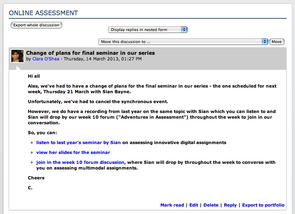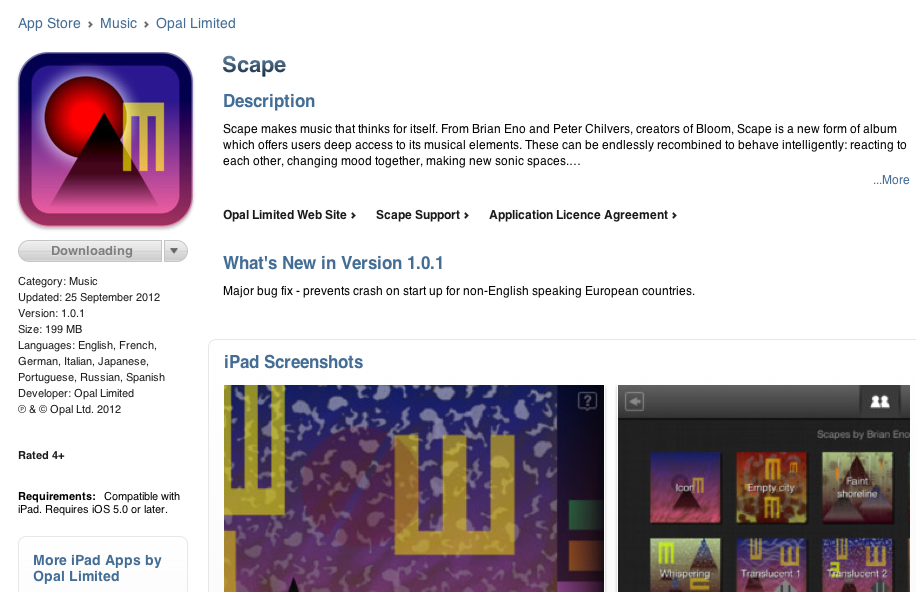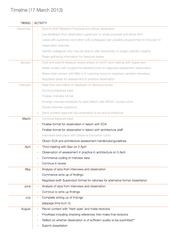|
I've been shadowing the Online Assessment discussions this week and have discovered and rediscovered some resources: These are the core and secondary readings (click to visit course site): This is Clara's transforming assessment seminar covering the Manifesto (link): Here's the transcript from my own EDC assignment with some useful links: http://multimodal-assignment.weebly.com/uploads/2/0/7/0/2070115/edc_transcript_from_voice_over.pdf Here's a link to Sian's OA session from last year: The audio: The slides: http://www.malts.ed.ac.uk/staff/sian/assessment/p01.htm
Finally, here's the text from the site about assessment in creative crisis:
0 Comments
EDC multimodality assignments
History of scholarship and print references from Sian:
Some of my rambling thoughts contesting the newness of multimodality and the the suggestion that it deprivileges writing as the mode that matters:
Dear James Thanks for this - could I ask for you to make a couple of amendments? Its important to note that reviews have no direct role in assessment. That is carried out later and without the students present. The review is a teaching and learning exercise aimed mostly at giving feedback on work and how it might be improved/developed prior to the final submission. I don't want to confuse the students so please remove references to assessment. "As part of my research I am interested in exploring whether the 'crit' used within architecture can help to inform assessment practices within other academic disciplines. To this end, I will sit in on the review day to observe what happens. I will not be involved in the review in any way and the names of participating students will not appear within my dissertation. Out of courtesy, I wanted to explain my presence in advance (and naturally, if you would prefer for me not to be present during your review, I will step out for that part of the session)." For your information I have attached a copy of the student project brief. Please could you come to Lauriston Place Architecture Crit room at 9.15am on Friday 5 April? Crits are going on simultaneiouly in foru locations but I will be there to introduce you to the tutors. Fiona Fiona McLachlan Professor of Architectural Practice
Here's the spiel from the course site on assessment as a creative crisis:
https://www.moodle.is.ed.ac.uk/mod/page/view.php?id=4176 An interesting post from Simon Starr on the OA13 course forum: https://www.moodle.is.ed.ac.uk/mod/forum/discuss.php?d=2135 It cover multimodality and assessment. James Mackay's essay on multimodality from EDC2012: http://online.education.ed.ac.uk/gallery/mackay_multimodal/ Things are slipping a little on the timeline, however I don't think it's looking too bad. Could be worse, even if there's a lot more black type ('to do') than grey ('done'!):
Last week I did the following:
This week I'm aiming to do the following:
Once completed, an activity will appear in pale grey. Additional activities will have their own section below.
It turns out that the Brian Eno that I downloaded only works on the iPad. So I can write off the £3.99 or shell out a few hundred quid on an iPad.
Let's do the maths. And now let's ignore the maths. Well, it's an investment, isn't it. Isn't it? To date I've carried out three of the seven interviews with members of the E-Learning course team. The conversations with Sian, Christine and Rory have all gone well, as far as I can tell. Some interesting themes seem to be emerging, even if I'm pointedly avoiding trying to reflect on the data after each interview to prematurely draw conclusions.
Having said that, one of the words - and themes - that was foregrounded within Rory's interview this morning however has stayed with me during the day. Rory commented that, in his experience, students tended not to present the MSc dissertation in a multimodal format. He went on to explain how it might be seen as 'risky'. Neither of these points are new to me: the fact that nobody else has submitted a multimodal dissertation is one of the reasons that I want to do so. And it's also clear from my earlier attempts at multimodal work that these are risky, not least in terms of the effort required to put the thing together. What has stayed me however has been the idea that I might be able to use the collected data from the interviews to warn me of potential problems and challenges in submitting multimodal work, as seen through the eyes of tutors. In addition, I might be able to get a sense of what tutors generally think are good and bad examples of multimodal work. This of course can help to inform my own work. If I know that tutors find it a challenge to navigate their way through non-linear artefacts (and I'm not saying that this is a conclusion that I've drawn), then maybe that should be something I avoid. Similarly, if there's consensus that images or sound are welcomed, those elements might be worth including. I'm not going to dwell on this just now, however when it comes to working through the interview data, I'll be sure to spend a bit of time applying some of these I'm just downloading the Brian Eno app that I might try to use to create ambient sound within my dissertation. The reviews seem good and it doesn't rely on traditional music instruments, so I might have a chance with it, then. What I have in mind - and I haven't given this too much thought or tried out the app yet, obviously - is to create a different pieces of ambient background music to accompany each component of my dissertation. The idea would be that the ambient background music might reflect the content of a particular component.
It will be interesting to try out the app, and also to see whether I can take a completed from file and work on it in SoundStudio, perhaps adding other electronic chatter. The electronic chatter could also be aligned to what appears within the text within that component, for instance it could be typing, the sound of speaking, it culd be audio recorded during the observation and so on. It's going to be fun trying to offer justification for all this in the 2000-word rationale that is required for the submission on non-traditional assessments. |
Categories
All
Archives
October 2013
TimelineOther stuff
|
||||||||||||||||||||||||
